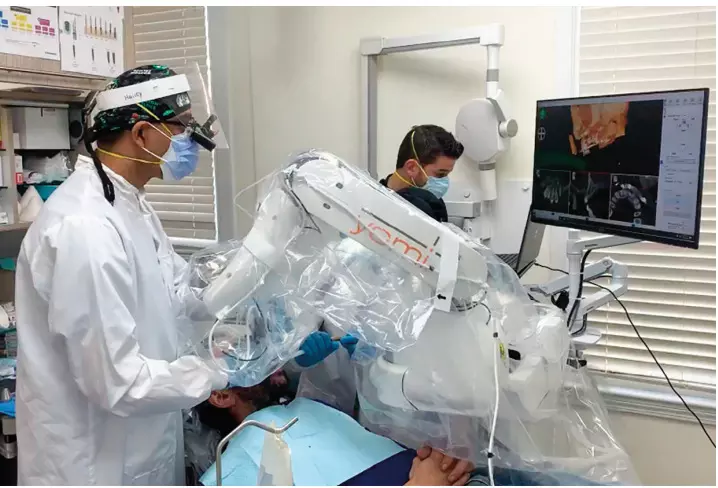Robotic dental implant surgery promising alternative to static guided-implant surgery

Digital technologies have been recognized as breakthrough innovations in implant dentistry, providing accurate, predictable, efficient, and customized approaches for diagnosis and treatment planning, implant surgeries, and prosthodontic treatments.
Researchers have been found in a new study that Robotic dental implant surgery promising alternative to static guided-implant surgery suggests a new study published in the Journal of Dentistry
The present study aimed to investigate the accuracy of the autonomous robotic computer-assisted implant surgery (r-CAIS) for single-tooth implant placement.
In the study ten patients with single dental implant placement were enrolled. No adverse surgical events and postoperative complications (i.e., infection and early implant failure) were reported. The autonomous robotic implant surgery exhibited a mean global coronal deviation of 0.74 mm (95% CI: 0.53 to 0.94 mm), a mean global apical deviation of 0.73 mm (95% CI: 0.53 to 0.93 mm), and an angular deviation of 1.11° (95% CI: 0.78 to 1.44°), respectively.
The researchers concluded that high accuracy of autonomous r-CAIS technology in single-tooth implant placement was attributed to the control of the angular deviation and axial errors.Within the limitations of this case series, the autonomous robotic computer-assisted implant surgery showed high accuracy for single-tooth implant replacement due to the control of the angular deviation and axial errors. Autonomous robot-assisted surgery may usher in a new era of digital implant dentistry, offering an unprecedented accurate surgical approach. Nevertheless, more clinical trials are required to support evidence-based clinical outcomes
The main findings of this study provide significant evidence to support the autonomous robotic implant surgery system as a potential alternative in dental implant surgery.
Reference:
Shuo Yang, Jiahao Chen, An Li, Ke Deng, Ping Li, Shulan Xu. Accuracy of autonomous robotic surgery for single-tooth implant placement: A case series, Journal of Dentistry,
2023, 104451,ISSN 0300-5712. https://doi.org/10.1016/j.jdent.2023.104451